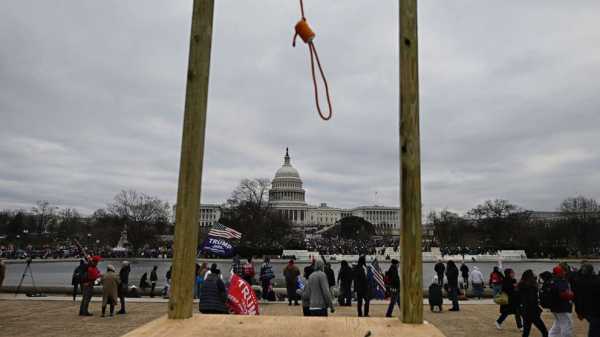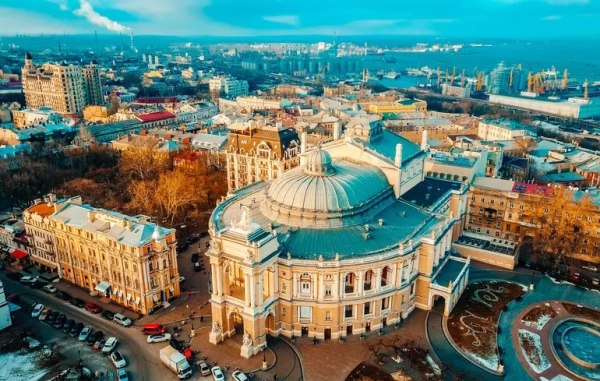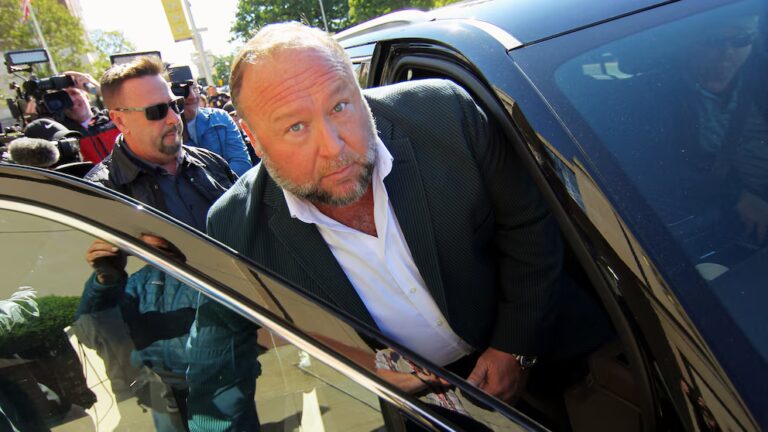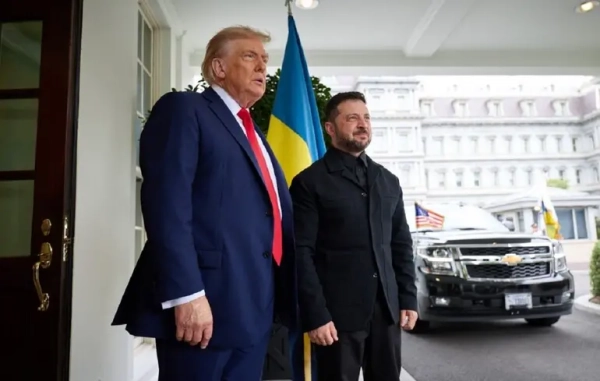
Democracy in PerilABC News Photo Illustration
The House select committee investigating the Jan. 6, 2021, attack on the U.S. Capitol spent six weeks this summer revealing in dramatic detail the findings of its year-long probe, placing former President Donald Trump at the center of what it has described as an "attempted coup."
In its last scheduled public hearing on July 21 in prime time, lawmakers laid out — moment-by-moment — the 187 minutes between Trump's rally at the Ellipse and his finally, grudgingly telling his violent supporters to "go home.'
Witness after witness testified how he told his supporters to march on the Capitol after being told some were armed — and then, back at the White House, watched the attack unfold on TV from his dining room, doing nothing, refusing pleas from top aides to call off the mob.
"President Trump didn't fail to act, he chose not to act," GOP Rep. Adam Kinzinger said, arguing Trump wanted the assault to succeed as the last desperate act in his plot to overturn the election. "A supreme violation of his oath of office," Kinzinger said, and "a complete dereliction of his duty to our nation."
MORE: Trump 'chose not to act' as mob attacked, Jan. 6 committee says
Republican Rep. Liz Cheney, the committee's vice chair, posed a central question for Americans with Trump now talking about a 2024 run for the White House: Given everything we've heard, she said, "Can a president who is willing to make the choices Donald Trump made during the violence of Jan. 6 ever be trusted with any position of authority in our great nation again?"

A video of former US President Donald Trump recording an address to the nation on January 7, 2021, is displayed on a screen during a hearing in Washington, July 21, 2022.Win Mcnamee/Getty Images
Overall, the panel held a series of eight sessions laying out what it called a "sophisticated, seven-part plan" by Trump to illegally remain in power despite his 2020 election loss to Joe Biden.
Even the day after Jan. 6 — despite all that had happened — the committee on Thursday showed outtakes of Trump struggling to tape a statement to the nation, refusing to say the words "this election is now over."

Members of the U.S. House Select Committee, U.S. Representative Pete Aguilar, Committee Chairperson Rep. Bennie Thompson and Committee Vice Chair Rep. Liz Cheney, attend the third of eight planned public hearings to investigate the Jan. 6 Attack on the United States Capitol, on Capitol Hill in Washington, June 16, 2022.Jonathan Ernst/Reuters
Witnesses have spanned from local election officials to White House insiders like Cassidy Hutchinson, who in bombshell testimony described how she was told an irate Trump was so eager to join his supporters at the Capitol after his speech at the Ellipse that he tried to grab the steering wheel in the presidential SUV.
Trump and his Republican allies have sought to discredit her, other witnesses and the panel, comprised of seven Democrats and two Republicans. Trump called the hearings a "disgraceful performance" and the committee members "con people."
Committee members have worked to counter the recent arguments made by Trump and his supporters that he was manipulated by people outside the administration — such as election lawyers John Eastman or Sidney Powell — and that he was not responsible for what transpired.
"This, of course, is nonsense," Cheney said at the seventh hearing. "President Trump is a 76-year-old man. He is not an impressionable child."
Here are highlights of what we've learned so far:
Trump was repeatedly told he lost the election, witnesses testified
Using taped depositions from Trump officials at the time — including Attorney General Bill Barr, White House counsel Pat Cipollone and Trump's daughter Ivanka — the panel argued the former president was "well aware" that he lost the election yet still moved forward with an illegal plot to stay in office.
Barr said he told Trump many times there was no fraud sufficient to overturn the results.
MORE: Trump fires back at Ivanka, Bill Barr over Jan. 6 deposition testimony
At one point, Barr testified, when Trump was pushing a baseless conspiracy about Dominion voting machines, he said, "I thought, boy, if he really believes this stuff, he has lost contact with — he's become detached from reality."

A video of Ivanka Trump, former White House senior adviser, is shown as the House select committee investigating the Jan. 6 attack on the U.S. Capitol holds a hearing at the Capitol in Washington, July 12, 2022.J. Scott Applewhite/AP
Despite this, Trump continued to raise money for his post-election strategy. But according to the committee, little of the $250 million raised by Trump for his court battles actually went to his legal defense.
Four days after the electors across the country met to make Biden the president-elect, witnesses testified about a chaotic meeting took place on Dec. 18 in the Oval Office. Sidney Powell, former Overstock.com CEO Patrick Byrne and former national security adviser Ret. Gen. Michael Flynn — Trump allies who propagated his false election claims — spoke with Trump alone for 10-15 minutes before White House officials learned of the meeting and made their way to join.
The two camps divulged into screaming matches, witnesses testified. Text messages aired by the committee showed Hutchinson telling Tony Ornato, then-White House deputy chief of staff for operations, that "the West Wing is unhinged."

An evidence document with the message from Cassidy Hutchinson reads “The West wing is UNHINGED” is shown on a screen during a full committee hearing on “the January 6th Investigation,” on Capitol Hill , July 12, 2022.Saul Loeb/AFP via Getty Images
Trump was directly involved in pressure campaign to reverse the results, committee says
The panel laid out evidence that Trump himself was directly involved in pressure campaigns to reverse his loss.
Ronna McDaniel, chair of the Republican National Committee, told the panel in a deposition that Trump called her to discuss plans for an "alternate" slate of electors who would claim Trump actually won.
Former Department of Justice officials testified about Trump's pressure on them to find instances of fraud and encourage states to send different "fake" electors. Richard Donoghue, the acting deputy attorney general at the time, said Trump asked the agency to seize voting machines among other requests.

Acting Deputy Attorney General Richard Donoghue (R) testifies flanked by Former Acting Attorney General Jeffrey A. Rosen (C) and former Assistant Attorney General for the Office of Legal Counsel Steven Engel (L) during the fifth hearing by the House Select Committee to Investigate the January 6th Attack on the Capitol in the Cannon House Office Building in Washington, D.C., June 23, 2022.Mandel Ngan/AFP via Getty Images
When they refused, they, testified, Trump became "agitated" and threatened to remove them from their positions. One man he considered appointing to acting attorney general was Jeffrey Clark, a less qualified but loyal official who was leading the department's environmental division and who was prepared to send letters to state leaders alleging the department had real concerns about fraud.
The situation came to a head in a Jan. 3, 2021, meeting when Trump asked what he had to lose if he appointed Clark. White House counsel Cipollone, it was said, stepped in to describe appointing Clark as a "murder-suicide pact."
Local election officials testified about the impact of Trump's campaign to overturn election results. One Republican official from Arizona teared up as he described the pressure placed on him to break his oath to the Constitution, and a mother-daughter duo described how being the target of a Trump tweet upended their lives and careers.
Trump 'summoned the mob' to Washington, the committee says
The panel highlighted a Twitter post sent by Trump at nearly 2 a.m. on Dec. 19, 2020, to his millions of followers they say was a call to action. The social media post happened hours after the chaotic meeting in the Oval Office between Trump officials and outside advisers like Powell who wanted to overturn the election.
"Big protest in D.C. on January 6th. Be there, will be wild!" Trump's tweet read.
The reaction from his supporters, including right-wing media personalities, was enthusiastic, the panel showed. Infowars host and conspiracy theorist Alex Jones said it was "the most important call to action on domestic soil since Paul Revere and his ride in 1776" while one YouTuber said a "red wedding" — a Game of Thrones reference about a slaughter — was going to happen.
The committee said Trump's tweets and statements motivated far-right and militant groups like the Proud Boys and Oath Keepers to take action.
Donell Harvin, former D.C. homeland security chief, said in a deposition these usually "non-aligned groups were aligning, and all the red flags went up at that point."
Jason Van Tatenhove, the former spokesperson for the Oath Keepers, said it was "exceedingly lucky that more bloodshed did not happen."
Trump knew crowd was armed when he told them to march on the Capitol, witness testifies
Hutchinson, a top aide to former White House chief of staff Mark Meadows, testified that Trump wanted more people to be admitted to his Ellipse rally but was warned by a Secret Service official that protesters outside security magnetometers were armed.
Trump's response, she said, was something to the effect of: "I don't f—ing care that they have weapons. They're not here to hurt me. Take the f—ing mags away. Let my people in."

Cassidy Hutchinson, a top former aide to Trump White House Chief of Staff Mark Meadows, testifies during the sixth hearing by the House Select Committee on the January 6th insurrection, June 28, 2022.Brandon Bell/Getty Images
The panel said law enforcement recordings described some protesters were seen carrying AR-15-style rifles, bear spray, body armor and flagpoles with knives attached to them.
The march to the Capitol was planned, the committee asserts
Despite claims that Trump's call for rally-goers to march to the Capitol was spontaneous, the committee laid out evidence suggesting that may not have been the case.
Obtained from the National Archives, an undated draft tweet showed Trump planned to alert his Twitter followers of the march.
"I will be making a Big Speech at 10AM on January 6th at the Ellipse… Please arrive early, massive crowds expected. March to the Capitol after. Stop the Steal!!," the draft tweet read. A stamp on the document indicated that it was approved by the president himself.

President Donald Trump speaks to supporters from The Ellipse near the White House, Jan. 6, 2021.Mandel Ngan/AFP via Getty Images
The panel also displayed a text exchange from Jan. 4, 2021, between White House Ellipse rally organizer Kylie Kremer and MyPillow CEO Mike Lindell in which they discussed plans to go the Capitol.
"This stays only between us, we are having a second stage at the Supreme Court again after the ellipse. POTUS is going to have us march there/the Capitol," Kremer wrote. "It cannot get out about the second stage because people will try and set up another and Sabotage it. It can also not get out about the march because I will be in trouble with the national park service and all the agencies but POTUS is going to just call for it 'unexpectedly.'"
Trump also planned on joining them, officials testified. Hutchinson said a Secret Service official told her of a physical altercation in the presidential vehicle when Trump was told he could not go and tried to grab the steering wheel.

Demonstrators attempt to enter the Capitol building during a protest, Jan. 6, 2021. Bloomberg via Getty Images
How close the mob got to Pence
The committee provided a never-before-seen photograph of a "heated" phone call between Trump and Vice President Mike Pence on the morning of Jan. 6, 2021. Hours later, Pence rejected Trump's demands to unilaterally reject Biden's electoral victory at the joint session of Congress.
MORE: Trump's 'heated' call with Pence on Jan. 6 revealed in new photos, testimony
New photographs were also shown of Pence and his family hiding in an underground location at the Capitol complex during the riot. They stayed at the location for more than four hours until Pence returned to preside over congressional certification of the electoral vote count.

A photo taken by a White House photographer on Jan. 6, 2021, and displayed during a House Select Committee investigates the Jan. 6 Attack on the US Capitol hearing on June 16, 2022, shows Vice President Mike Pence looking at a tweet by President Donald Trump on his phone in an underground parking garage of the U.S. Capitol complex during the insurrection.Fishel, Justin/White House
"Approximately 40 feet, that's all there was, 40 feet between the vice president and the mob," said Rep. Pete Aguilar, D-Calif., of how close Trump's violent supporters came to Pence as he tried to escape from the Capitol.
When asked about the mob chanting "Hang Mike Pence," Meadows said of Trump, "He thinks Mike deserves it," Hutchinson testified she overheard. Trump responded to her account indirectly by claiming he "never" said "Hang Mike Pence."

A noose is seen near the U.S. Capitol as supporters of President Donald Trump gather on the west side of the building in Washington, D.C., Jan. 6, 2021.Andrew Caballero-Reynolds/AFP via Getty Images, FILE
Trump tweeted about Pence knowing the mob was inside the Capitol, witnesses said
An incendiary tweet from Trump about his vice president amid the riot was a pivotal moment for witnesses at Thursday's hearing. The tweet, sent at 2:24 p.m. at the height of the violence, said Pence "didn't have the courage to do what should have been done."
Then-White House deputy press secretary Sarah Matthews said she thought the tweet "was the last thing that was needed in that moment" from Trump.
"He should have been telling these people to go home, and to leave, and to condemn the violence that we were seeing," she said. "For him to tweet out the message about Mike Pence, it was him pouring gasoline on the fire, and making it much worse."
Republicans sought pardons, witness says
Testimony revealed how several Republican members of Congress sought pardons in the final days of the Trump administration.
Among those listed by witnesses were Reps. Scott Perry of Pennsylvania, Mo Brooks of Alabama, Andy Biggs of Arizona, Matt Gaetz of Florida, Marjorie Taylor Greene of Georgia and Louie Gohmert of Texas.
One after another, Republican lawmakers dismissed or denied the allegations.
John McEntee, a former Trump White House aide, testified that at one point, the idea of a "blanket pardon" was floated for everyone involved in Jan. 6.
Cheney, one of two Republican lawmakers on the committee, had a message for her GOP colleagues who continue to support Trump's lies about the 2020 election: "There will come a day when Donald Trump is gone. But your dishonor will remain."
Sourse: abcnews.go.com






